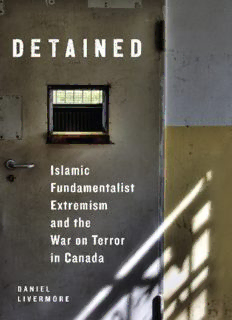
Detained: Islamic Fundamentalist Extremism and the War on Terror in Canada PDF
Preview Detained: Islamic Fundamentalist Extremism and the War on Terror in Canada
detained 30180_Livermore.indd 1 18-08-02 16:11 30180_Livermore.indd 2 18-08-02 16:11 DETAINED Islamic Fundamentalist Extremism and the War on Terror in Canada daniel livermore McGill- Queen’s University Press Montreal & Kingston • London • Chicago 30180_Livermore.indd 3 18-08-02 16:11 © Daniel Livermore 2018 ISBN 978-0-7735-5509-9 (cloth) ISBN 978-0-7735-5551-8 (ePDF) ISBN 978-0-7735-5552-5 (ePUB) Legal deposit third quarter 2018 Bibliothèque nationale du Québec Printed in Canada on acid-free paper that is 100% ancient forest free (100% post-consumer recycled), processed chlorine free We acknowledge the support of the Canada Council for the Arts, which last year invested $153 million to bring the arts to Canadians throughout the country. Nous remercions le Conseil des arts du Canada de son soutien. L’an dernier, le Conseil a investi 153 millions de dollars pour mettre de l’art dans la vie des Canadiennes et des Canadiens de tout le pays. Library and Archives Canada Cataloguing in Publication Livermore, Daniel, 1946–, author Detained: Islamic fundamentalist extremism and the war on terror in Canada / Daniel Livermore. Includes bibliographical references and index. Issued in print and electronic formats. ISBN 978-0-7735-5509-9 (hardcover). – ISBN 978-0-7735-5551-8 (ePDF). – ISBN 978-0-7735-5552-5 (ePUB) 1. Terrorism – Canada – Prevention. 2. National security – Canada. 3. Terrorism – Prevention – International cooperation. 4. Islamic fundamentalism – Canada. 5. War on Terrorism, 2001–2009. 6. Canada – Foreign relations – United States. 7. United States – Foreign relations – Canada. 8. Muslims – Canada – Social conditions – 21st century. 9. Racial profiling in law enforcement – Canada. 10. Security, International. I. Title. HV6433.C3L58 2018 363.3250971 C2018-903371-1 C2018-903372-X This book was typeset by Marquis Interscript in 10.5/13 Sabon. 30180_Livermore.indd 4 2018-08-22 13:00:13 Dedicated to Leslie, Sarah, Simon, and David, for their infinite patience with this project And in memory of: Len Mader, Jim Gould, Peter Bakewell, Don Saunders, and Michael Chesson, colleagues and friends who left us too soon 30180_Livermore.indd 5 18-08-02 16:11 30180_Livermore.indd 6 18-08-02 16:11 Contents Preface and Acknowledgements ix Part one 1 Into the World of Open Conflict 3 2 Into the 1990s 30 3 Ressam and the Eve of 9/11 56 4 The War on Terror Begins 74 5 Afghanistan, “Black Sites,” and the Abyss of Guantanamo Bay 95 6 Rendition, Extraordinary Rendition, and Security Certificates 123 Part two 7 Ahmad Abou-Elmaati 151 8 Abdullah Almalki 171 9 Maher Arar 195 10 Abdullah Khadr 215 11 Abousfian Abdelrazik 231 Conclusion: The Heritage of the War on Terror 250 Notes 261 Bibliography 311 Index 331 30180_Livermore.indd 7 18-08-02 16:11 30180_Livermore.indd 8 18-08-02 16:11 Preface and Acknowledgments In the decade following the tragic terrorist attacks of 11 September 2001, dozens of Canadian citizens and residents of Canada were detained and taken “off the streets” in the deadly international conflict known in the United States as the “war on terror.” Some of their stories became well known. Maher Arar spent almost a year in detention in Syrian dungeons following his rendition from New York by US authorities. Abousfian Abdelrazik left Canada for a short visit to his native Sudan and ended up in Sudanese prisons or quasi-asylum in the Canadian embassy in Khartoum. His return to Canada after six years of exile was finally ordered by the Federal Court of Canada. Abdullah Khadr, eldest son in what became known as Canada’s first family of terror, was eventually captured in Pakistan and jailed in both Pakistan and Canada until his release by the Canadian courts. Others also made the front pages of Canadian newspa- pers. Over the course of a decade, many Canadians, Canadian residents, and persons with ties to Canada were identified as adversaries in the war on terror and jailed beyond Canadian shores. This book focuses on Canadians believed by security authorities to be associated with Islamic fundamentalist extremism and the al Qaeda move- ment. After the devastating attacks of 9/11, US security and intelligence organizations were desperately short of “actionable intelligence” on what they feared would be a second wave of attacks against the US heartland. They decided to detain suspected extremists worldwide and get them “off the streets,” to use their exact words, where they could be interrogated for what they knew about future threats. Among the thousands of people detained after 9/11 were several Canadians or Canadian residents who had been identified as suspects by the Royal Canadian Mounted Police 30180_Livermore.indd 9 18-08-02 16:11
Description: